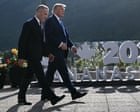
In recent days, significant developments have emerged on the economic fronts of North America and Russia, with implications for international trade and economic policies. These occurrences illustrate the dynamic nature of global economics and prompt careful reflection on future prospects.
In North America, the Canadian government recently made a pivotal decision to retract its planned digital services tax on U.S. technology companies. This move comes after discussions with the United States, where there was intense focus on trade relations and economic cooperation. The U-turn was met with varied reactions, with U.S. officials perceiving it as a concession to President Donald Trump’s administration. The White House expressed satisfaction with the shift, highlighting it as a positive step for future trade negotiations.
This decision is expected to revive stalled trade talks between the two neighboring countries, providing a more cooperative framework for addressing economic matters. As discussions continue, businesses and policymakers are considering this development’s broader implications on bilateral ties and the global digital economy.
Meanwhile, heading further east, recent discussions at the Saint Petersburg International Economic Forum cast a spotlight on the Russian economy’s current status. Russian President Vladimir Putin reassured attendees of the conference held in June that the country is not on the verge of recession. Despite his assurances, economic data suggests a noticeable slowdown. This has stirred mixed opinions among government officials, with some expressing confidence in resilience, while others quietly voice concerns about the economic trajectory.
Russian economic strategies remain under close evaluation as authorities strive to balance domestic growth with external economic pressures. Observers note that maintaining economic stability in the face of fluctuating global conditions is crucial for Russia’s long-term economic health.
In parallel, discussions in Europe at the European Central Bank (ECB) gathering in Sintra focused on inflation perspectives amid trade policy shifts. Jay Powell, head of the U.S. Federal Reserve, shared insights on how recent tariffs could affect inflation rates within the coming months. These anticipated impacts underscore the intricate interplay between trade policies and global economic indicators.
Christine Lagarde, President of the ECB, joined Powell in reiterating the importance of collective responses to address these monetary challenges. As central banks closely monitor inflationary trends, policy adaptability remains crucial in responding to evolving economic landscapes.
Overall, the recent developments in North America and Russia highlight the interconnectedness of global economies and underscore the importance of clear communication and strategic planning. As countries navigate complex economic waters, these events serve as a reminder of the delicate balance required to sustain economic growth and international cooperation.
Source: {link}
